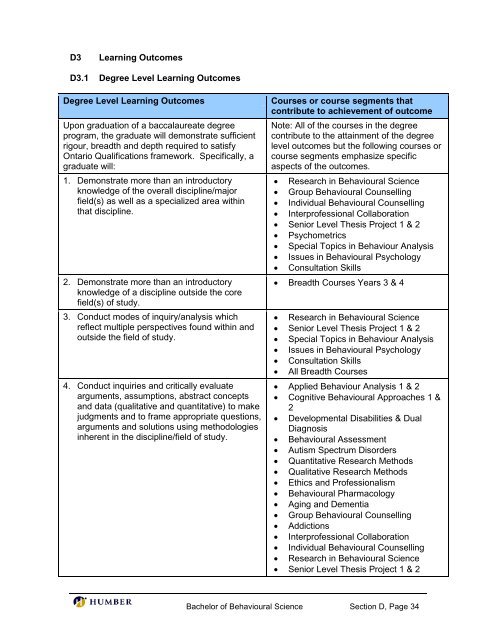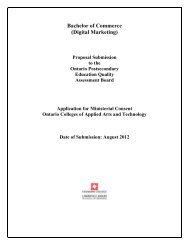Bachelor of Behavioural Science - Postsecondary Education Quality ...
Bachelor of Behavioural Science - Postsecondary Education Quality ...
Bachelor of Behavioural Science - Postsecondary Education Quality ...
You also want an ePaper? Increase the reach of your titles
YUMPU automatically turns print PDFs into web optimized ePapers that Google loves.
D3<br />
Learning Outcomes<br />
D3.1 Degree Level Learning Outcomes<br />
Degree Level Learning Outcomes<br />
Upon graduation <strong>of</strong> a baccalaureate degree<br />
program, the graduate will demonstrate sufficient<br />
rigour, breadth and depth required to satisfy<br />
Ontario Qualifications framework. Specifically, a<br />
graduate will:<br />
1. Demonstrate more than an introductory<br />
knowledge <strong>of</strong> the overall discipline/major<br />
field(s) as well as a specialized area within<br />
that discipline.<br />
2. Demonstrate more than an introductory<br />
knowledge <strong>of</strong> a discipline outside the core<br />
field(s) <strong>of</strong> study.<br />
3. Conduct modes <strong>of</strong> inquiry/analysis which<br />
reflect multiple perspectives found within and<br />
outside the field <strong>of</strong> study.<br />
4. Conduct inquiries and critically evaluate<br />
arguments, assumptions, abstract concepts<br />
and data (qualitative and quantitative) to make<br />
judgments and to frame appropriate questions,<br />
arguments and solutions using methodologies<br />
inherent in the discipline/field <strong>of</strong> study.<br />
Courses or course segments that<br />
contribute to achievement <strong>of</strong> outcome<br />
Note: All <strong>of</strong> the courses in the degree<br />
contribute to the attainment <strong>of</strong> the degree<br />
level outcomes but the following courses or<br />
course segments emphasize specific<br />
aspects <strong>of</strong> the outcomes.<br />
Research in <strong>Behavioural</strong> <strong>Science</strong><br />
Group <strong>Behavioural</strong> Counselling<br />
Individual <strong>Behavioural</strong> Counselling<br />
Interpr<strong>of</strong>essional Collaboration<br />
Senior Level Thesis Project 1 & 2<br />
Psychometrics<br />
Special Topics in Behaviour Analysis<br />
Issues in <strong>Behavioural</strong> Psychology<br />
Consultation Skills<br />
Breadth Courses Years 3 & 4<br />
Research in <strong>Behavioural</strong> <strong>Science</strong><br />
Senior Level Thesis Project 1 & 2<br />
Special Topics in Behaviour Analysis<br />
Issues in <strong>Behavioural</strong> Psychology<br />
Consultation Skills<br />
All Breadth Courses<br />
Applied Behaviour Analysis 1 & 2<br />
Cognitive <strong>Behavioural</strong> Approaches 1 &<br />
2<br />
Developmental Disabilities & Dual<br />
Diagnosis<br />
<strong>Behavioural</strong> Assessment<br />
Autism Spectrum Disorders<br />
Quantitative Research Methods<br />
Qualitative Research Methods<br />
Ethics and Pr<strong>of</strong>essionalism<br />
<strong>Behavioural</strong> Pharmacology<br />
Aging and Dementia<br />
Group <strong>Behavioural</strong> Counselling<br />
Addictions<br />
Interpr<strong>of</strong>essional Collaboration<br />
Individual <strong>Behavioural</strong> Counselling<br />
Research in <strong>Behavioural</strong> <strong>Science</strong><br />
Senior Level Thesis Project 1 & 2<br />
<strong>Bachelor</strong> <strong>of</strong> <strong>Behavioural</strong> <strong>Science</strong> Section D, Page 34
















